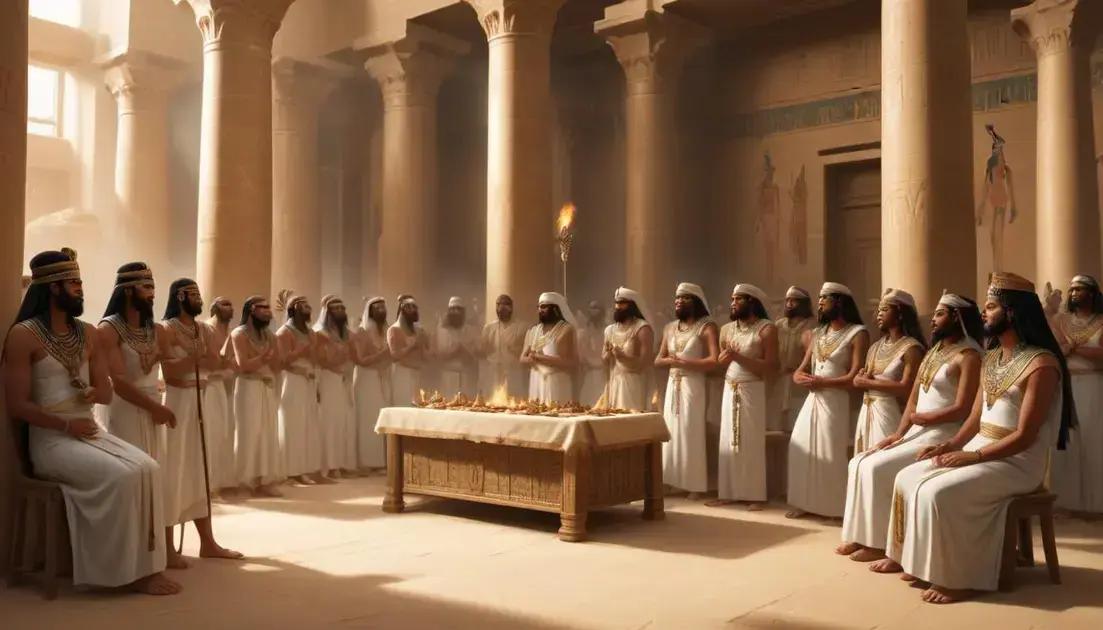
Christian Egypt Under Byzantium: Liturgy and Resistance
The Islamic conquest significantly affected Christianity in Egypt, leading to a shift in religious dynamics. While Islam became the dominant faith, many Egyptian Christians resisted adopting Byzantine theological practices, maintaining their unique traditions. This struggle shaped their identity and community, showcasing resilience and cultural richness despite pressures to conform. Today, the heritage of the Coptic Church reflects this enduring commitment to faith and tradition.
Christianity in Egypt has a rich history that intertwines liturgical practices with cultural resilience. Have you ever wondered how a faith adapted to survive amidst external pressures?
The development of Egyptian liturgy
The development of Egyptian liturgy has deep roots in the early Christian community. It reflects the unique culture and traditions of Egypt. Egyptian Christians have a rich history that shaped their practices.
Historical Roots
The liturgy started to form shortly after Christianity spread in Egypt. As believers gathered, they created rituals that matched their community’s needs. This was not just about worship; it was about expressing their faith and identity.
Unique Practices
Unlike the Byzantine liturgy, Egyptian liturgy incorporated local customs. It included distinct music, language, and rituals, making it feel familiar. This connection helped believers maintain their traditions even under pressure.
Resistance to Change
Over time, the Byzantine Empire tried to impose its liturgy on Egyptian Christians. However, they resisted this pressure. Their dedication to maintaining their unique practices showed their strength and faith. They believed that their way of worship was crucial for their identity.
Modern Implications
Today, the Egyptian liturgy continues to thrive. It serves not only as a form of worship but also as a cultural symbol. Many Egyptian Christians view their liturgy as a celebration of their rich heritage, blending ancient traditions with their present-day faith.
Resistance against Byzantine theology
Resistance against Byzantine theology in Egypt was a crucial part of the Christian community’s identity. Egyptian Christians faced pressure to adopt beliefs and practices from the Byzantine Empire. However, they chose to stand strong in their faith.
Historical Background
As Christianity spread, Byzantine influence grew in the region. Bishops and leaders tried to impose specific liturgical and theological practices. This often led to tension and conflict.
Maintaining Tradition
Despite challenges, Egyptian Christians held onto their unique ways of worship. They believed in their traditions and pushed back against outside influences. This struggle was like a fight for their faith and culture.
Defining Beliefs
Many Egyptian Christians developed distinct theological views. Their beliefs often differed from those enforced by Byzantine leaders. This diversity enriched the Christian community and showcased their commitment to authenticity.
Impact on Identity
This resistance played a big role in shaping Egyptian Christian identity. It fostered a sense of belonging and community. Believers found strength in their shared history and commitment to their faith.
Impact of Islamic conquest on Christianity in Egypt
The impact of the Islamic conquest on Christianity in Egypt was profound and lasting. When the Arabs arrived in the 7th century, they brought significant changes. The rise of Islam affected all aspects of life, including religion.
Shifts in Religious Dynamics
After the conquest, Islam became the dominant faith in Egypt. Many Christians felt pressure to convert. However, a strong Christian community remained. They adapted to new realities while holding onto their beliefs.
Changes in Worship
With the Islamic rule, Christian liturgies and practices faced challenges. Some traditions were preserved, but others faded away. This sparked a unique blending of cultural and religious elements.
Social and Political Influence
Islam greatly influenced the social and political landscape in Egypt. Christians had to navigate their place in a Muslim-majority society. Some found new roles in governance and trade, while others faced discrimination.
Long-term Effects
Over centuries, the Christian community adjusted to Islamic rule. Despite challenges, many traditions survived. Today, the Coptic Church remains a vital part of Egypt’s identity, showcasing rich heritage and resilience.
Conclusion
In conclusion, the impact of the Islamic conquest on Christianity in Egypt has shaped the community’s identity. Despite significant changes, many Egyptian Christians have held on to their faith and traditions. This resilience is a testament to their rich heritage.
The blending of cultures and beliefs demonstrates the complex history of Egypt. Today, the Coptic Church remains a vital part of Egyptian society. By understanding this history, we can appreciate the strength and diversity of Christian faith in Egypt.


